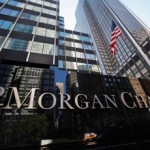JPMorgan Chase Earns 19 Percent Less to Start the Year

JPMorgan Chase (JPM), the largest but no longer the most profitable U.S. bank, announced a 19 percent decline in first-quarter earnings this morning, with weaker income from trading and sluggish mortgage activity. Shares fell as much as 3.7 percent in pre-market trading. Chief Executive Jamie Dimon is attempting to find the bank’s footing amid stronger rules on capital requirements and intense scrutiny from regulators.
The bank reported $5.3 billion in net income, down from $6.5 billion in the first quarter of 2013, as revenue fell broadly across its vast operations. Mortgage-related revenue fell 42 percent, fixed-income trading revenue fell 21 percent, and consumer and community banking revenue fell 25 percent.
Wells Fargo (WFC), meanwhile, announced today that its first-quarter earnings had climbed 14 percent, to $5.89 billion. The San Francisco-based rival took away JPMorgan’s title as the highest-earning bank last year, as Dimon oversaw some $23 billion of settlements with regulators probing his company’s mortgage business, its failure to detect Bernie Madoff’s Ponzi scheme, and the legality of its hiring practices in China. The bank posted its first quarterly loss of Dimon’s tenure in October 2013.
JPMorgan’s board, which Dimon chairs, granted him a 74 percent raise in January, raising his overall compensation to $20 million.
JPMorgan’s per-share earnings of $1.28 were 7 percent below what analysts were expecting. Of the 43 analysts covering the stock tracked by Bloomberg, 31 rate it a buy. None changed their recommendation this morning. Concern that JPMorgan’s results augur poorly for the rest of the economy contributed to slight losses across the stock market, with the Standard & Poor’s 500 index falling 0.6 percent in early trading.
The rest of the big banks will announce their results next week: Citigroup reports on April 14, Bank of America goes next on April 16, and Goldman Sachs and Morgan Stanley round out the big six on April 17.
It’s been a tumultuous few weeks for the bank’s leadership. Mike Cavanagh, the co-head of JPMorgan’s investment bank and widely seen as a potential successor to Dimon, quit to work in the more lightly policed waters of private equity in March. And Blythe Masters, the controversial head of the bank’s commodities business, announced her departure on April 2. Masters played a role in the invention of credit derivatives, the exotic financial products that caused so much havoc in the 2007-2008 financial crisis. Last summer, JPMorgan paid $410 million to settle a government investigation into whether Masters’s division illegally manipulated energy markets; the bank sold the business for $3.5 billion on March 19.
Source: businessweek



























